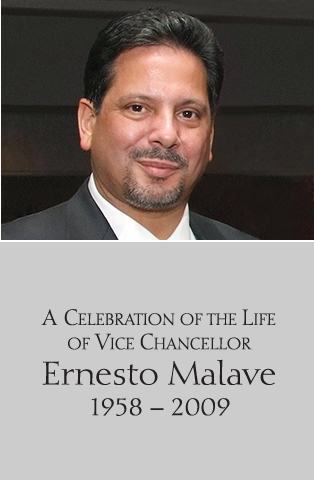 A video remmemberance of Vice Chancellor Ernesto Malave.“/>
A video remmemberance of Vice Chancellor Ernesto Malave.“/>
![]() A video remmemberance of Vice Chancellor Ernesto Malave.
A video remmemberance of Vice Chancellor Ernesto Malave.
Ernesto Malave
1958-2009
It was the late 1970s when Ernesto Malave, lacking a high school diploma but harboring a laser mind and great determination, stepped through the doors of Borough of Manhattan Community College (BMCC), then located on West 51st Street on the edge of the theater district. Long-haired, with a South Bronx pedigree and a taste for hard rock, he enrolled in an innovative program that gave students a second chance at a high school degree and credits towards college.
At BMCC, Ernesto quickly made himself known. He declared his candidacy for Student Senate. With his remarkable focus and skills of persuasion, he won. A new student, he was now an advocate for students. It was a commitment he would forever keep.
The seeds of Ernesto’s professional future—and his personal future as well, since he met his wife, Miriam, at BMCC—were planted in those early years. The roots took hold quickly. The City University of New York was the institution that would nurture him, the place where he could grow. For three decades, so much of Ernesto Malave’s life—the flourishing of his professional identity and his rise to positions of increasing responsibility, influence, and leadership—was intertwined with its people, and with honoring and preserving its critical role in this great city and state.
As a student leader at BMCC, he served as a member of the University Student Senate from 1979 to 1981 and as student representative to the CUNY Board of Trustees Committee on Faculty, Staff and Administration in 1979-1980. He was treasurer of BMCC’s Student Government, and from 1980 to 1981 served as its president. In 1984, when he earned his bachelor’s degree from the College of New Rochelle, he had already been on the staff of CUNY for a year, as an admissions advisor in the Office of Admissions Services.
Two years later, there was a change in direction, a broadening of scope: Ernesto was appointed the University’s assistant director of governmental relations, responsible for representing CUNY’s interests at City Hall and in Albany. Four years later, in 1989, he joined the University budget office as a budget analyst and assistant to the budget director. Later, he was promoted to executive assistant to the vice chancellor for budget, finance and computing.
He had found his métier. In January 1996 Ernesto Malave became CUNY’s acting budget director, a post he fully assumed in 1998. Chancellor Matthew Goldstein named him interim vice chancellor for budget and finance in 2002 and vice chancellor in 2003.
Managing the University’s finances and advocating for CUNY’s financial survival while staying true to its fundamental mission of offering affordable, accessible, quality higher education to New Yorkers of all circumstances presents demanding, ever-shifting challenges. With his remarkable talents, Ernesto met those challenges head-on. He knew CUNY and the political landscape in which it exists inside and out.
Ernesto could argue his points with relentless focus—and translate the numbers into plain English. He was as comfortable explaining the complexities of CUNY’s multibillion-dollar budgets to legislators as to the University Faculty Senate, student government, and other student groups. He took the time to bring his “budget school” to officials and students at leadership retreats, decoding the University’s finances so that tough choices could be understood and shared.
He was also creative. Navigating the University through increasingly choppy financial straits, Ernesto helped devise a brilliant public-private financing mechanism—the CUNY Compact, now the New York Compact for Public Higher Education—that would help keep the University moving forward on an even financial keel.
Above all, he was passionate about protecting the students who would be most affected by the vagaries of the economy, preserving counseling, advisement and other services critical to student retention and success. Even as funding for the University constricted, he found ways to bring more full-time faculty into the classroom.
Ernesto lived and breathed CUNY. He was also Miriam’s husband, Ernesto and Erik’s father, a son, a brother, a mentor, beloved colleague, and friend to many. He played a scrappy game of pickup basketball and listened to soothing Spanish ballads and other oldies at his desk.
Ernesto managed a vast financial universe, but he was no ordinary chief financial officer. His bottom line was keeping CUNY’s riches affordable for the most economically vulnerable of students—whether hailing from his old South Bronx neighborhood, Flatbush, East Elmhurst, or the Lower East Side—who surge through the University’s golden doors each year. That he kept that promise will always be remembered.

